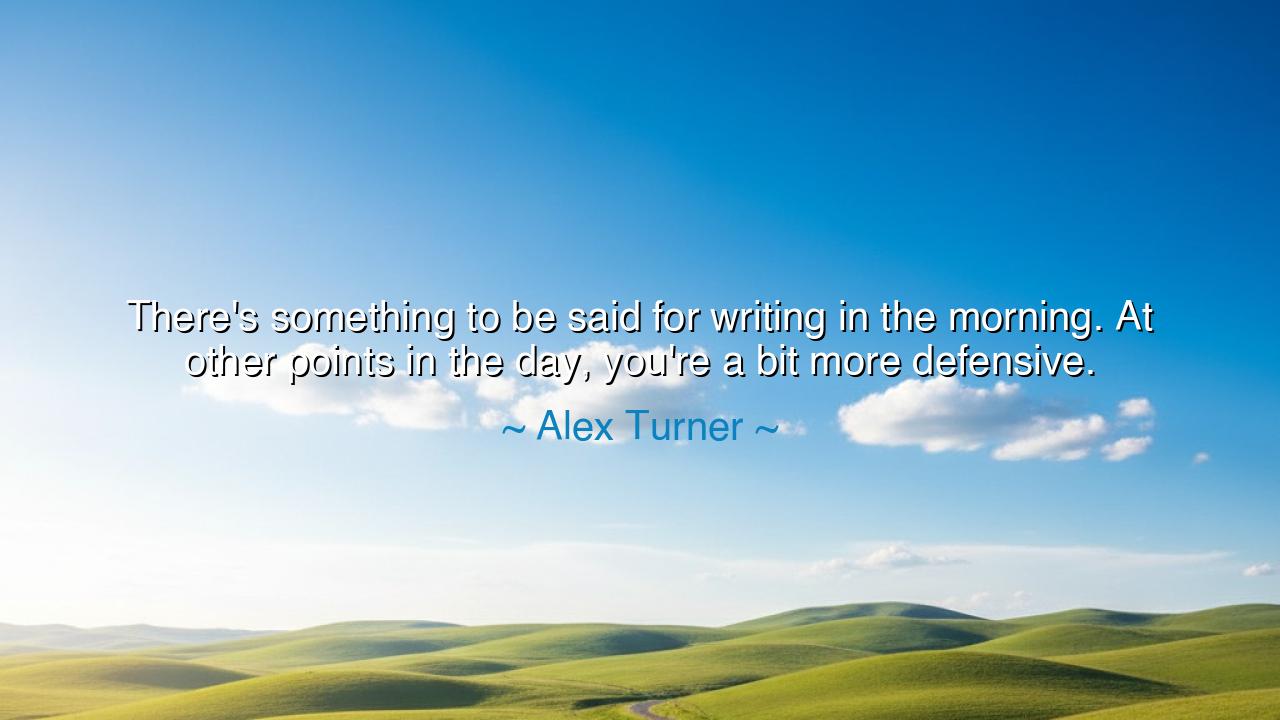
There's something to be said for writing in the morning. At
There's something to be said for writing in the morning. At other points in the day, you're a bit more defensive.






Alex Turner once observed: “There’s something to be said for writing in the morning. At other points in the day, you’re a bit more defensive.” Though spoken with simplicity, these words carry the timeless wisdom of the creative spirit. They remind us that the dawn is not merely the beginning of the day, but also the most sacred time for the birth of ideas, when the mind is unguarded, soft, and open to inspiration.
In the morning, before the demands of the world intrude, the spirit is like still water, reflecting clearly the shapes of hidden thoughts. At this hour, the imagination is freer, unburdened by the day’s judgments, expectations, and fears. To write then is to capture truth before the armor of self-consciousness is strapped on. By contrast, as the hours advance, we become more defensive—we measure, we calculate, we censor. The voice of the critic grows louder, and the quiet muse of creativity is often drowned.
The ancients themselves knew this secret. Monks rose before sunrise to pray and compose their hymns, believing that God’s voice was clearer in the early hours. Poets and philosophers, from Homer to Thoreau, often spoke of the morning as the wellspring of inspiration. It is as though the night’s dreams, fragile and fleeting, still cling to the soul at dawn, ready to be transformed into words and visions before the noise of life dispels them.
History gives us vivid examples. Benjamin Franklin, a man of many disciplines, began his mornings by asking, “What good shall I do today?” and used the early hours to reflect and create. Ernest Hemingway, too, insisted on writing with the rising sun, saying that at dawn “there is no one to disturb you, and it is cool or cold, and you come to your work and warm as you write.” Turner’s insight belongs to this same tradition, a recognition that creativity is strongest when the mind is unguarded and the world is still.
Yet his words also reveal a deeper truth: that creativity requires vulnerability. To write is to expose one’s soul, and this is easiest when the spirit is soft and unarmored, as it is in the morning. Later in the day, when one is more defensive, the ego erects its shields, protecting itself from potential pain or failure, but in doing so, it also blocks the raw honesty that art demands. The morning is thus not only a time of freshness but also of courage—the courage to let one’s truest thoughts emerge without disguise.
The lesson for us is clear: if you seek to create, guard your mornings as sacred. Do not waste them in trivialities or distractions. Instead, use them for the work of the soul—writing, thinking, dreaming, building. Trust that the vulnerability of dawn is not weakness, but strength, for it allows what is hidden to come forth unfiltered. By honoring the early hours, you honor the deepest part of yourself.
Therefore, remember Alex Turner’s words as a teaching: the morning is not only the beginning of the day but the beginning of truth. Approach it with reverence. Take up your pen or your craft when the light first breaks, and let the freshness of the hour guide you. For when the day grows heavy and the heart grows defensive, it is often too late. But at dawn, you are still open, still free—and it is there that the seeds of greatness can be planted.






AAdministratorAdministrator
Welcome, honored guests. Please leave a comment, we will respond soon